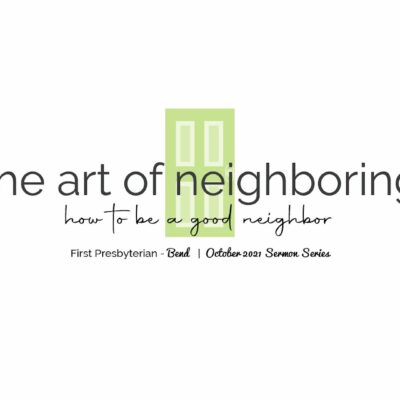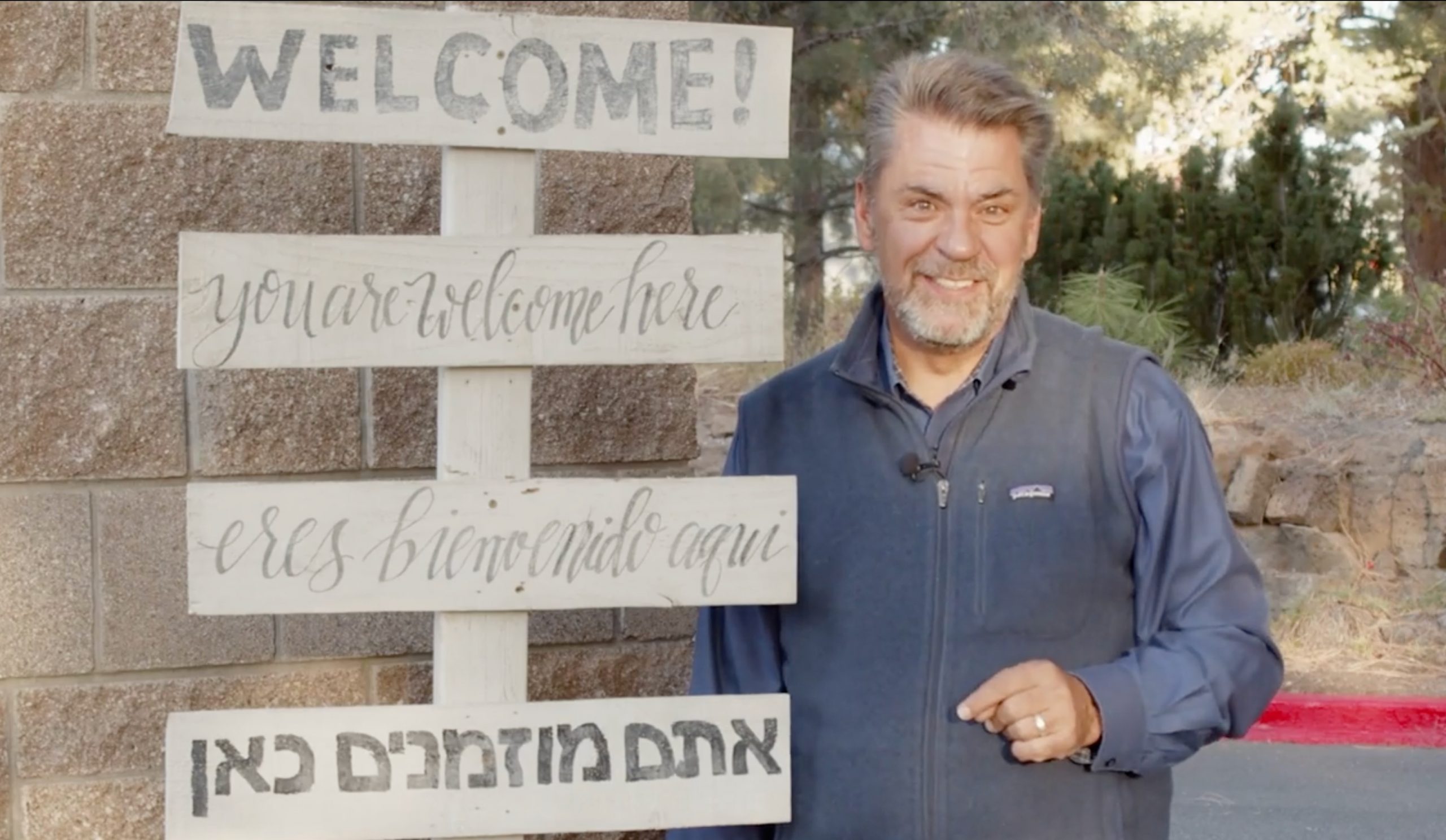Oct 17th, What if Jesus Really Meant What He Said? with Rev. Dr. Steven Koski.
A Part of the Series:
Rev. Dr. Steven Koski
Other Articles in:
Oct 17th, What if Jesus Really Meant What He Said? with Rev. Dr. Steven Koski.
Jesus said, Follow me. He didn’t say believe these six things about me. He said, Follow me.
He taught a different way of being in the world. The earliest followers of Jesus were not known as Christians. They were called followers of the way. And the way of Jesus was a way of love centered around showing your love for God in the way you love your neighbor. In our Bible story today Jesus is confronted by a lawyer. I’m not a lawyer like we would understand today, but this lawyer was a religious expert on the law of Moses. This lawyer has an agenda.
He is looking to trap Jesus, to discredit him. Sort of like today when reporters ask politicians questions looking for that gotcha moment to embarrass and discredit the person talking. So this lawyer tries to get Jesus in a gotcha moment, asking “teacher, what must I do to inherit eternal life now?” Eternal life. For the Jewish audience, witnessing this interaction between Jesus and the lawyer meant something very different than the way we might talk about eternal life.
Today, eternal life didn’t mean life forever as much as it meant a quality of life, the life that is really life. So Jesus hears this question. He knows he’s an expert in religious law and already knows the answer to the question he’s asking.
Jesus patiently listens. He doesn’t take the bait. Instead, Jesus responds with a question of his own. It’s interesting in this day and age when everyone assumes they have the answer and insists they are right.
Jesus modeled curiosity and Jesus was far more likely to ask a question than answer one. So Jesus asked the lawyer, “what is written in the law? How do you read it?” The lawyer and expert in the law doesn’t hesitate, likely, puffs up his chest and spits out verbatim, what he knows to be the facts according to the law. Quoting both from Deuteronomy and the Book of Leviticus, from the law of Moses.
And the lawyer answers, Love the Lord, your God, with all your heart and with all your soul, with all your strength and with all your mind and love your neighbor as yourself.
Jesus looks at him and says, you have answered correctly. We’re in total agreement. But Jesus doesn’t stop there. Jesus doesn’t say Congratulations. You win the prize for having the right answer and being the expert above all experts when it comes to the law of Moses.
Jesus doesn’t congratulate the lawyer for having the right answer, but pushes the lawyer past what he thinks he already knows and says to him, do this and you will live. Do you want to inherit eternal life? It’s not a matter of just knowing the right answers, believing or saying the right things.
Do this, Jesus says, and you will live. You will find the life that is really life. The lawyer didn’t know what to say. He begins by falling back on his identity, on his gifts. As a lawyer, and he starts looking for loopholes.
Apparently, once WC Fields was actually reading the Bible and his wife came and said, what are you doing reading the Bible? You never read the Bible? WC Fields said to his wife, looking for Loopholes. My dear, looking for loopholes.
Verse 29 says, but he wanted to justify himself. So he asked Jesus. The lawyer asked Jesus, and who is my neighbor?
Well, what do we do when we want to justify ourselves?
We want to preserve our identity and protect our reputation, and at the same time, release ourselves with the burden of responsibility, or any guilt. We come up with reasons and excuses why we acted in a certain way or why we chose not to act in a certain way. So the lawyer is trying to figure out how he can maintain his image as a religious expert. So he asked, Jesus, tell me exactly who is my neighbor now? He’s no longer worried about trapping Jesus.
He’s trying to make sure he doesn’t get trapped. He asked, Jesus, tell me, who is it I need to love. And more importantly, who can I ignore who is my responsibility and who can I leave to others to take care of? The lawyer asks, who is my neighbor now? Jesus being Jesus didn’t answer the question.
He tells a story. Jesus wasn’t interested in the right answers. Jesus desired the lawyer’s heart. So he told a story. A man was traveling from Jerusalem to Jericho. He’s assaulted by thieves who robbed him, beat him, leave him for dead by the side of the road.
Two religious leaders, a priest and a Levite, are traveling the same road. They don’t stop to help the man lying on the side of the road. They pass by on the other side.
Now, as Jesus tells his story, he doesn’t offer an explanation or justification as to why they didn’t stop. Who knows? Maybe they were in a hurry. Maybe they were in a hurry to get to the temple to perform their religious duties. I mean, no doubt the man was bleeding in it. If they would have stopped to help, they would have become unclean and not then be able to perform their sacred duties in the temple.
Now those surrounding and listening to Jesus tell the story, including the lawyer.
They would actually appreciate why the priest and the Levite would keep a distance. They probably feel that they were actually justified for not stopping.
Now I’m just speculating because Jesus didn’t actually tell us why they didn’t stop. All we know is they keep walking.
Why do we keep walking? How do we justify not stopping? So many people pushed to the side of the road right now, pushed to the margins, broken, beaten down, really in need of help.
What are the excuses we tell ourselves for why we keep walking?
Father Greg Boyle said, God doesn’t call us to the margins to make a difference.
God calls us to care for our neighbors on the margins so that we will be different.
So Jesus continues. He then describes a third traveler down this road, a Samaritan who sees the man beaten and left for dead.
He stops, bandages his wounds, puts him on a donkey, and takes him to what would be the equivalent of a hospital and promises to pay all of his medical bills.
Now, at this point, the lawyer and all of those who are listening to Jesus tell this story would not only have been shocked but offended by Jesus using a Samaritan as the hero in the story and an example of what love looks like. In Jewish eyes at that time, there was no such thing as a good Samaritan. Samaritans were the enemy, the adversary. They were the hated, despised other.
So Jesus, rather than throwing facts at the lawyer or debating and arguing with the lawyer, he tells a story where a Samaritan that, the enemy, is the hero and the embodiment of mercy and generosity. And Jesus turns to this expert in the law and asks another question, which of these three do you think was a neighbor to the man who fell into the hands of robbers?
Now note that the lawyer couldn’t even say the word Samaritan out loud. So he says the one who showed mercy, and then Jesus said for the second time, go and do likewise.
Now the lawyer asked, Well, who is my neighbor trying to kind of justify who he includes and who he leaves out?
And Jesus being Jesus doesn’t answer that question, but it invites a different question for all of us.
What sort of neighbor are you?
Are you a good neighbor?
What if Jesus really meant what he said when he told us to love our neighbor? What if the road to eternal life, the life that really is life cuts right through our neighborhoods.
I’m wondering if our hope for healing in this time of deep division and distrust might actually be found in getting to know our neighbors and wrestling with what it means to be a good neighbor, right where we live at the Church. We’ve worked really hard to be good neighbors with Bend High School and Bear Creek elementary.
But I’m embarrassed to confess, I don’t really know the people in the neighborhood around us who live in the houses around us or the businesses that are near us.
Honestly, I’ve only gotten to know some of the names of our near neighbors because they’re really angry and fearful about the city’s plans for a proposed homeless camp adjacent to our parking lot.
I’m curious.
I’m curious if these conversations that are happening right now that are centered so much around anger and fear.
I’m curious if those conversations would be different if we really knew our neighbors, if we knew their stories.
I’m curious if those conversations would be different if our neighbors trusted that the Church genuinely cared about them and their needs. I’m curious if these conversations, if these conversations would be different, if we are actually able to sit down and break bread together and we actually included our homeless neighbors in the conversations, and we were able to imagine together how we might find solutions centered in love and not in fear.
What if Jesus really meant what he said when he said, Love your neighbor, meaning the people around you, the people next door, even the ones you tend to ignore or even despise?
There’s a really helpful book called The Art of Neighboring, Building Genuine Relationships right Outside Your Door by Jay Pathok and Dave Rung. In the book, they said Right now, when there’s so much loneliness, disconnect, and division, we don’t need churches to create a bunch of new programs.
What we need is for the people who attend those churches to be intentional and thoughtful in being a good neighbor, right where they live.
So if loving our neighbor is central to who we are as followers of the way of Jesus, it would be a good idea if we knew our neighbors and be known by our neighbors as people who reflect the mercy and compassion of Jesus.
The authors of this book visited hundreds of churches, literally hundreds of churches around the country, asking congregations, what kind of neighbor are you?
Are you a good neighbor? And they led people through this exercise where they asked people to imagine their neighborhood using a grid with nine squares. I’d like you to imagine it with me. The center square represents your house and the eight squares surrounding represent the houses that are closest to you geographically.
And then they then asked three questions about the eight closest neighbors.
The first, what are the names of the eight closest neighbors to your house?
Second, what are some relevant, superficial information you know about the lives of these neighbors?
And because we’re actually called to love our neighbors, they asked a third question, what is something deeper?
Something you would only know about your neighbors by connecting with them at a deep level.
Now, the authors said in their survey hundreds of churches around the country that only 10% of people could honestly list the names of all eight neighbors. Only 3% of all surveyed could fill out surface information regarding their neighbors, and less than 1% surveyed could share something deeper and meaningful about their neighbors.
I don’t know about you. I found myself getting really defensive as I was going through this exercise. Like the lawyer I wanted to justify myself. I was coming up with 1001 reasons why I shouldn’t be held to that kind of standard. I’m too busy. I have other people to care about. It’s hard. It’s so awkward.
And then I realized that I knew the names and the stories of some of my neighbors, not because I’ve been a good neighbor, but because when Lori was so sick, they showed up as the presence of mercy. When that mercy was really needed. They mowed our lawn, they cooked meals, they dropped off cookies, they left notes.
They stopped. They took time to kind of check in. They were doing their best to bandage our wounds. And their mercy changed my experience of living in my own neighborhood.
Imagine for a moment if you knew who in our Church community actually lives in your neighborhood. And imagine if you took the time to build relationships with your neighbors who are already part of our Church community.
Now imagine if you then banded together and asked how together you can pour love into your neighborhood, how together you can be a reflection of the mercy and the compassion of Jesus, especially to those in need in your own neighborhood.
Now imagine if we as a Church as we as a Church community focused our hearts on being better neighbors, being better neighbors to the people who live near us, the businesses that surround us.
Now imagine if each one of us, if every single one of us watching this, wherever you happen to be.
If you made it your mission to get to know and be a good neighbor to the eight neighbors that are closest to you.
Imagine if this broken world of ours, this world that is filled with so much division and distrust and loneliness.
Imagine if this world could be healed one neighbor at a time.
We don’t choose to love our neighbors, to convert them. I want to be clear about that. This is not a bait and switch. We don’t choose to love our neighbors, to convert them.
We love our neighbors because we are converted and desire to live and love in the way of Jesus. Knowing that way leads to the life that is real life.
Jesus told stories to engage the heart. As you know, I often turn to poetry to engage the heart. So I want to finish today with this poem by Mary Oliver called Moments.
There are moments that cry out to be fulfilled, like telling someone you love them or giving your money away, all of it.
Your heart is beating, isn’t it? You’re not in chains, are you? There is nothing more pathetic than caution when headlong might save a life, even possibly your own.
Friends, may we not live with caution like the priest and Levite justifying why we hold our love back. Instead, may we be like the Samaritan going headlong into loving our neighbors, knowing it might save a life, even possibly our own.
May it be so.



